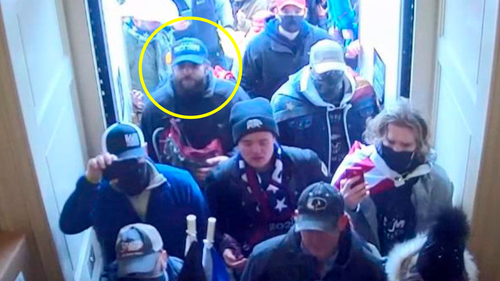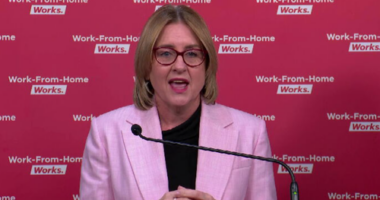Share this @internewscast.com
The unfolding case of Taylor Taranto, who was sentenced for possessing illegal firearms near the Washington, DC, home of former President Barack Obama, has sent ripples through the Justice Department’s community, including its employees and alumni, according to several sources speaking to CNN.
In June 2023, Taranto was apprehended following an alarming online livestream where he claimed to possess a detonator and expressed intentions to locate underground tunnels leading to the homes of Obama and other prominent figures, as reported by law enforcement at the time.

Taranto sentenced to 21 months
Initially, Taranto had caught the attention of federal authorities due to his presence at the January 6 Capitol riot. However, he became a priority for law enforcement after he posted a video in 2023 threatening to bomb federal facilities, leading to his arrest near Obama’s residence in Washington.
On the day of his arrest, authorities discovered firearms and hundreds of rounds of ammunition in Taranto’s vehicle. He was subsequently convicted on multiple gun-related charges and for making false threats regarding an intent to detonate a car bomb at a federal building.
The Department of Justice maintained its pursuit of a 27-month sentence, as initially requested by prosecutors White and Valdivia, who highlighted in court documents that Taranto had also issued threats against former House Speaker Kevin McCarthy and Maryland Representative Jamie Raskin.
Taranto’s defense attorney urged the court to consider the time he has already served as sufficient, proposing no additional incarceration. The defense, led by Carmen Hernandez, also advocated for court-ordered rehabilitation, citing Taranto’s military background and a diagnosis of post-traumatic stress disorder, detailed in a recent filing.
Typically, a defendant’s history and characteristics become part of court arguments for or against leniency when a judge decides a sentence.
At a hearing Thursday, Nichols sentenced Taranto to 21 months in prison, essentially covered by time served.
Nichols found that Taranto “made troubling statements” in his online livestream but noted he had no criminal history and his conduct “was far from egregious.”
Taranto spoke briefly during Thursday’s hearing, not to apologise for his conduct but to highlight a book on the 1787 constitutional convention and mention that some people questioned the results of the 2020 election.
“I would like to keep people’s minds open,” he concluded.
The judge also said he thought the two prosecutors placed on leave “upheld the highest standard” throughout the case.
“My view is that they did a commendable and exceptional job,” Nichols said of the prosecutors, adding that he felt “they did a truly excellent job in this case.”
White and Valdivia attended Taranto’s sentencing and declined to comment.












